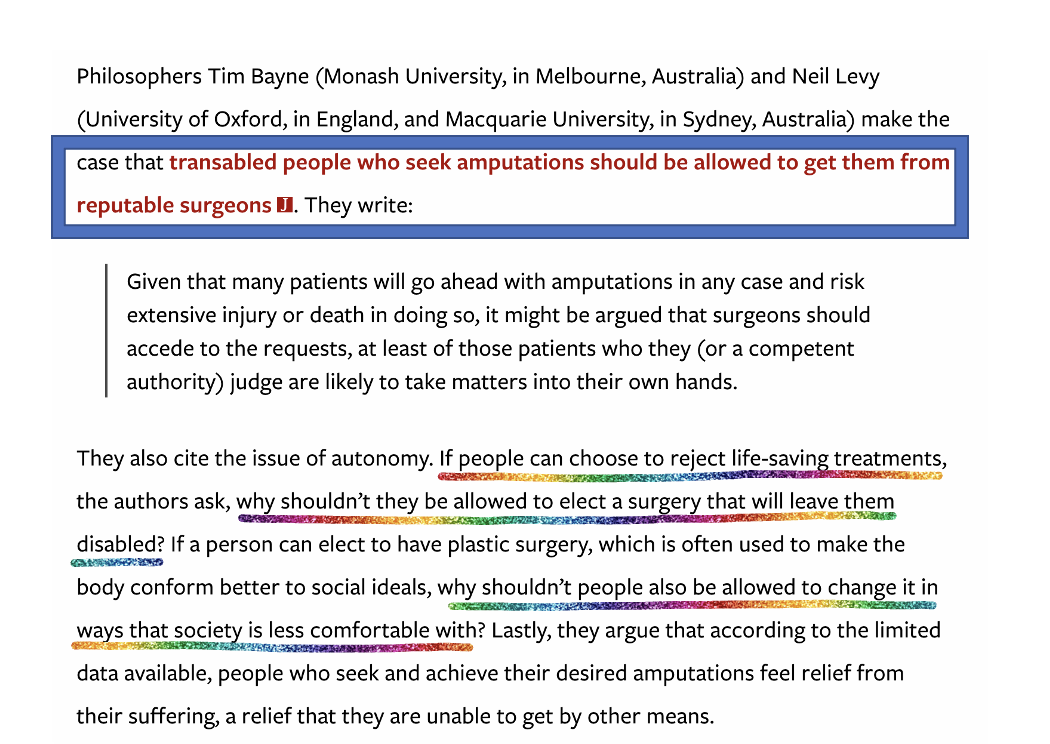Transableism seems to be emerging as a more culturally accepted term for an extremely rare mental disorder called Body Integrity Identity Disorder (BIID). The diagnosis, however, is not currently recognized in the Diagnostic and Statistical Manual (DSM) as a mental disorder. It is not farfetched to imagine that this troubling "trend" of protected classes will also, at some point, include the governmental protection of those who want to purposely mutilate their bodies to achieve a long-desired disability.
Jørund Viktoria Alme is a transgender Norwegian man who always wanted to be a disabled woman. According to his Twitter profile, he is also a "wheelchair user due to a neurological condition called BID." He is married with two children.
In 2013, Chloe Jennings-White spent most days in a wheelchair by choice, despite having no actual disability. The only reason she hasn't had the surgery is because it is so costly. She thinks it would be the "happiest day of her life" if she were to have the surgery. She often "fantasizes about being in a car accident" to realize her dream of becoming a paraplegic. Jennings-White also participates in "extreme sports," like skiing aggressively when not in her wheelchair. She says it helps her deal with her anxiety from BIID. Jennings-White says she has never tried to get disability benefits because of the BIID. However, that does not mean that others with a similar affliction might not try to get them.
A few years ago, a "transabled" woman named Jewel "went blind on purpose" by blinding herself with drain cleaner. She found a psychologist "willing to help her" with the process. He told her if she "did the research," he would help her become blind. After researching several painful methods involving chemicals, Jewel gave drain cleaner to the therapist, who then put droplets of the chemical into her eyes. He then waited by her side for thirty minutes "to ensure the damage was done" before rushing her to the hospital, where doctors fought to save her vision.
In another place and time, a psychologist who willingly blinded a patient to satisfy a psychological itch would be arrested and imprisoned for malpractice. However, we may now come to see the mutilating behavior as just another treatment rationalized by therapists who subscribe to the model of gender-affirming care therapy for body-dysphoric individuals.
Gender-affirming care was pushed in 2018 by the American Academy of Pediatrics as a preferred treatment for minors who are gender dysphoric. Because it is an affirmative, not an exploratory model of care, it sometimes leads to elective and dangerous sex-changing surgeries for children. It is a model of care whose defining rule is that the individual is who they claim to be, regardless of context. The second rule is that no one, including the parents, can question that claim. Affirming care is the subject of an excellent documentary called "Affirmation Generation."
Transableism is BIID
According to a 2009 paper on BIID, the term "describes the extremely rare phenomenon of persons who desire the amputation of one or more healthy limbs or who desire a paralysis. Some of these persons mutilate themselves; others ask surgeons for an amputation or the transsection of their spinal cord."
A now-defunct website devoted to the disorder once discussed the "wannabes, pretenders, and devotees" of the BIID community. Anthropology scholar Jenny L. Davis used the website dedicated to BIID bloggers to help formulate insights on the condition.
The term wannabe refers to those who want/need to have a physical impairment. Pretenders act out their impairment needs by, for example, folding an appendage, inserting ear plugs, wearing opaque contacts, walking on crutches, wheeling themselves in a chair, or wearing neck/leg/back braces. Devotees experience fetishistic attractions toward the physically impaired bodies of others.
Most of the bloggers seemed to have struggled with the condition since early childhood and were often secretive and deeply stigmatized. Being transabled was a "natural or essential state" for them. Many also argued for elective surgeries that would allow them to become disabled in one way or another.
Ethical concerns emerged in the discussions, too—with some arguing it is better to have a qualified surgeon perform the surgery than to do it themselves. A man who calls himself One Hand Jason cut off his right arm because "his goal was to become disabled." During his interview, he stated his "goal was to get the job done with no hope of reconstruction or re-attachment, and I wanted some method that I could actually bring myself to do. I did experiments with animal legs I got from a butcher. It's lucky I thought of that because some of my early attempts were total fuck ups and would have ended up with a damaged hand which might have had to undergo years of painful reconstruction, and worse yet, no amputation."
 Transableism/Surgeries/https://www.jstor.org/stable/24355072?mag=the-complicated-issue-of-transableism
Transableism/Surgeries/https://www.jstor.org/stable/24355072?mag=the-complicated-issue-of-transableism
While some states are attempting to ban chemical castration and sex-altering surgeries for minors, our justice department is actively challenging the states that would dare to legislate the bans. It will be interesting to see whether "Transableism" will become another widely accepted protected class in the American civil rights movement requiring medical, psychological, and societal accommodations.


